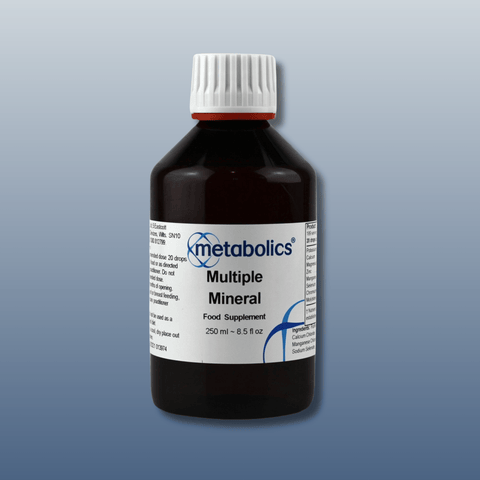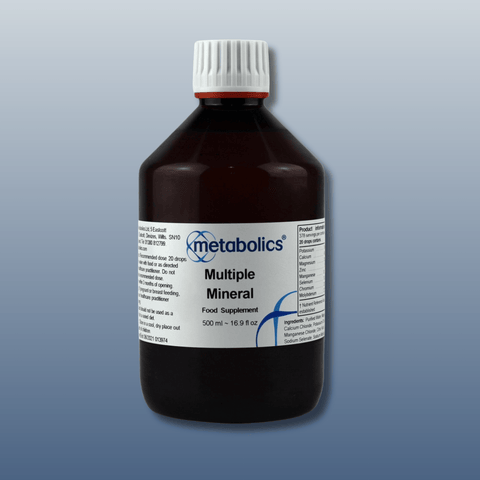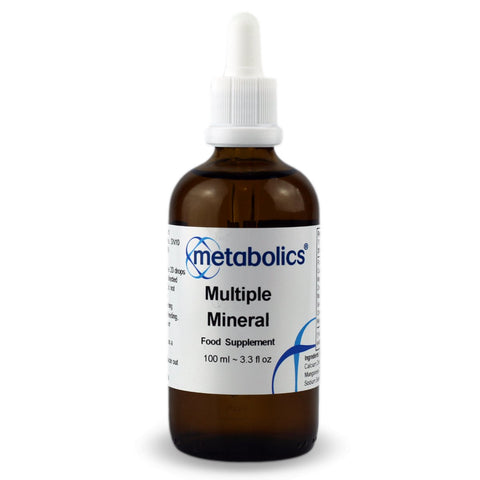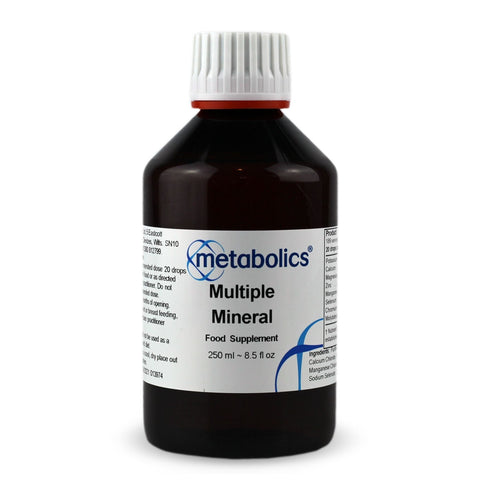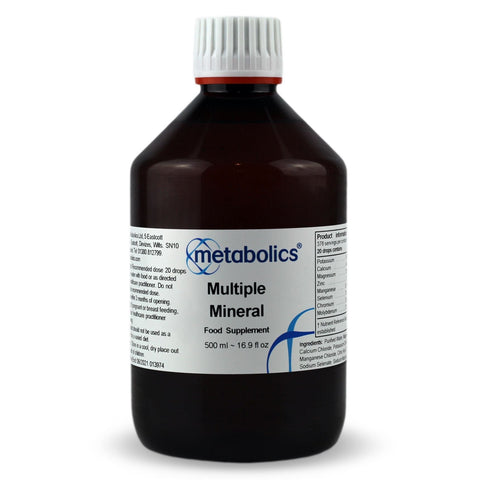Suitable For
There are 2 types of minerals required for healthy functioning of the body:
1) Trace minerals (the body only needs a small amount).
2) Macrominerals (the body requires larger amounts).
These essential minerals in Metabolics Multiple Mineral liquid are mainly in the chloride form. Chloride is important in itself as an electrolyte which, along with other electrolytes such as sodium, potassium and carbon dioxide maintain the acid-base balance in the body to maintain the correct balance of body fluids.
This new Multiple Mineral liquid is a perfectly balanced combination of minerals in a highly absorbable form.
20 drops provide an easily deliverable daily dose of all those essential minerals for health.
This liquid form makes it suitable for all ages, particularly those who have difficulty swallowing capsules, children and the elderly.
Chloride is a key player in supporting the body's digestive system. As an essential dietary mineral, chloride is vital for the production of digestive fluids. Specifically, it contributes to normal digestion by aiding in the production of hydrochloric acid in the stomach. By providing chloride for hydrochloric acid, the mineral significantly contributes to the digestive process, ensuring optimal nutrient absorption for overall well-being. Metabolics Multiple Mineral provides 160mg of chloride per serving, contributing 20% of the daily NRV. This chloride is derived from the magnesium, calcium, zinc, and potassium salts included in the formula.
Chromium contributes to normal macronutrient metabolism. Studies indicate that chromium plays a significant role in enhancing insulin action and influencing carbohydrate, lipid, and protein metabolism. It is an essential component of enzymes involved in carbohydrate and lipid metabolism, promoting the catabolism of carbohydrates and fats by potentiating insulin action. This, in turn, positively impacts glucose metabolism. Chromium deficiency in humans has been linked to impaired glucose tolerance and utilization, potentially resulting from increased resistance to insulin.
Chromium also contributes to maintaining normal blood glucose levels. Numerous studies, including those conducted by Jeejeebhoy et al., Freund et al., Brown et al., SCF (Scientific Committee on Food), IoM (Institute of Medicine), and EVM (Expert Group on Vitamins and Minerals) titled "Scientific Opinion on the substantiation of health claims related to chromium and contribution to normal macronutrient metabolism, maintenance of normal blood glucose concentrations, contribution to the maintenance or achievement of a normal body weight, and reduction of tiredness and fatigue pursuant to Article 13 of Regulation (EC) No 1924/2006", have consistently shown that chromium depletion is associated with hyperglycemia, or high blood glucose levels.
Metabolics Multiple Mineral liquid contains:
Zinc (as Zinc Chloride), which:
• Contributes to normal DNA synthesis.
• Contributes to normal acid base metabolism.
• Contributes to normal carbohydrate metabolism.
• Contributes to normal cognitive function.
• Contributes to normal fertility and reproduction.
• Contributes to normal macronutrient metabolism.
• Contributes to normal metabolism of fatty acids.
• Contributes to normal metabolism of vitamin A.
• Contributes to normal protein synthesis.
• Contributes to the normal maintenance of bones, hair , skin and nails.
• Contributes to the maintenance of normal testosterone levels in the blood.
• Contributes to the maintenance of normal vision.
• Contributes to the normal function of the immune system.
• Contributes to the protection of DNA, proteins and lipids in the cell from oxidative damage.
• Has a role in the process of DNA synthesis and cell division.
Manganese (as Manganese Chloride) which:
• Contributes to normal energy yielding metabolism.
• Contributes to the maintenance of normal bones.
• Contributes to the normal formation of connective tissue.
• Contributes to the protection of cells from oxidative stress.
Chromium (as Chromium chloride) which.
• Contributes to normal macronutrient metabolism.
• Contributes to the maintenance of normal blood glucose levels.
Potassium (as Potassium molybdate) which.
• Contributes to normal function of the nervous system.
• Contributes to normal muscle function.
• Contributes to the maintenance of normal blood pressure.
Selenium (as Sodium selenate) which:
• Contributes to normal spermatogenesis.
• Contributes to the maintenance of normal hair and nails.
• Contributes to the normal function of the immune system.
• Contributes to the normal thyroid function.
• Contributes to the protection of DNA, proteins and lipids from oxidative damage.
Molybdenum (as Potassium Molybdate) which:
• Contributes to normal sulphur amino acid metabolism.
Quality Assured:
Supplement Facts
20 drops contains:
%NRV*
Potassium
36 mg
2 %
Calcium
40 mg
5 %
Magnesium
20 mg
5 %
Zinc
3 mg
30 %
Manganese
0.55 mg
28 %
Selenium
30 mcg
55 %
Chromium
20 mcg
50 %
Molybdenum
27 mcg
54 %
† Nutrient Reference Value (NRV*) not established
Ingredients
Directions / Dosage
 Liquid
Liquid
Warning
Storage
Product Type



